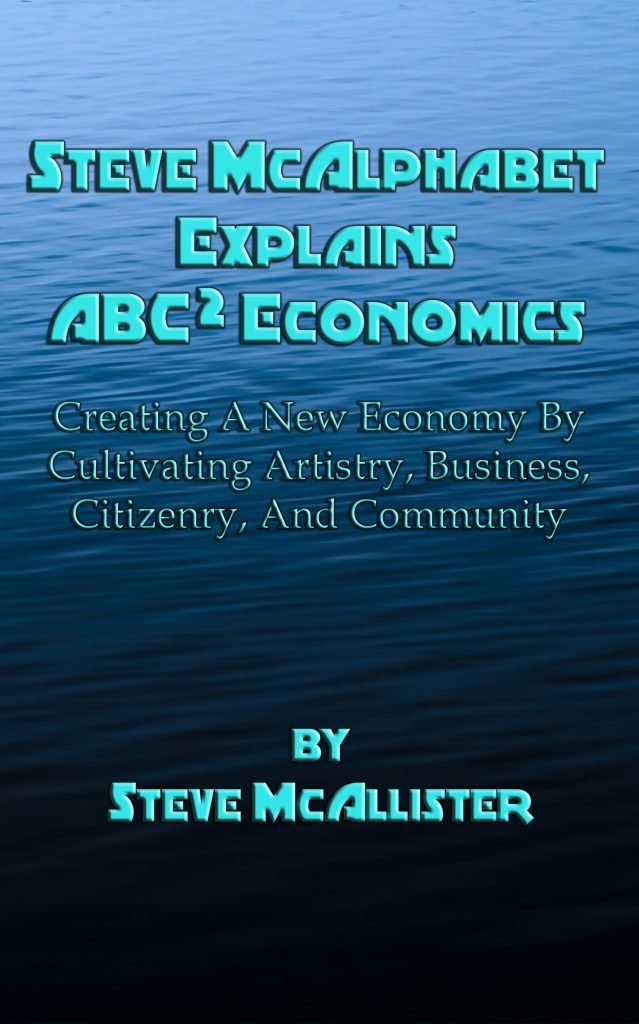“Until we had shareable information goods,” writes Paul Mason in Postcapitalism: A Guide To Our Future, “the basic law of economics was that everything is scarce. Supply and demand assumes scarcity. Now certain goods are not scarce, they are abundant – so supply and demand become irrelevant. The supply of an iTunes track is ultimately one file on a server in Cupertino, technically shareable by everyone. Only intellectual property law and a small piece of code in the iTunes track prevent everybody on Earth from owning every piece of music ever made. Apple’s mission statement, properly expressed, is to prevent the abundance of music.”
Yet beyond the manufactured scarcity still practiced by capitalist corporations, “The internet is a participatory gift economy,” says Charles Eisenstein in Sacred Economics, “the P2P (peer to peer) network in which there is no consistent distinction between a producer and a consumer. When we share news, product recommendations, songs, and so forth with our online networks, we do not charge another for our ‘information services.’ It is a gift economy. The content of most websites is free as well.”
Or as Kevin Kelly points out in The Inevitable: Understanding the 12 Technological Forces That Will Shape Our Future, “The internet is less a creation dictated by economics than one dictated by sharing gifts.”
As we open ourselves to the Wisdom Revolution, we have the capacity to realize that life is more abundant than the limitations of the market and its invisible hand would like us to believe as long as we use wisdom in dealing with it. As such, we should embrace ways and means of celebrating this abundance beyond the limitations of the past, or those we keep dragging into the present. Not only should we realize the power of the Gift Economy, but in addition to dollars, our mainstream economy should include bitcoins, time dollars, and other digitized currencies.
We have the capacity to harness our digital developments of electricity and information to optimize labor and material, and develop a more interdependent economy. It really comes down to what our goals are and what the purpose of our economy is.
“The quest for a new economics begins with a simple question for which the answer should be obvious,” says David Korten in Change The Story, Change The Future: A Living Economy For A Living Earth. “Is the purpose of the economy to maximize the profits of money-seeking corporate robots or the health and well-being of living households?”
We need a new economic model that allows currency to flow where we desire rather than being distorted by the self-centered gains of the elite. The ABC2 Economics model is based on the flow of nature to ensure greater sustainability than the current system, which often works in opposition to nature. By working with our planet and realizing we are actually part of it, we can develop a sustainable, resilient quality of life for humanity and the rest of the world.
“If we were to establish a worldwide industrial system that harmonized with nature,” says Daniel Pinchbeck in How Soon is Now: From Personal Initiation to Global Transformation, “enhancing the biodiversity and resilience, the superorganism of humanity would become a kind of a ‘supernature’. We should make it our mission to create a hyper complex planetary civilization perfectly integrated with the Earth’s ecology. If this seems impossible to achieve, perhaps that is because we are only now turning our focus in this direction. Many things that once seemed impossible have been accomplished by human willpower and imagination.”
Although humanity has certainly made a mess of the planet with this economic system of endless growth, we have also created some truly incredible inventions and made some brilliant innovations. Fortunately, we still have the capacity to innovate and invent. Whatever acts of genius we come up with next to empower people to do purposeful work of service through their Artistry, Business, Citizenry, and Community, ABC2 Economics serves to upgrade our activities by helping to channel the flow we create into a more vibrant, yet manageable, economy.
“We can think of our current civilization,” says Daniel Pinchbeck in How Soon is Now: From Personal Initiation to Global Transformation, “its technical and socio-political infrastructure, its ideology and beliefs – as an operating system, much like the software that runs our computers. Now we need to reboot and install a new system software. A new social design could, eventually, give every human being the opportunity to flourish and thrive, to live creatively, without fear for their future. Accomplishing this is a great mission that will require a truly rational, empathic application of our technical and creative powers.”
ABC2 Economics helps us recognize that the true economy, the truly global economy, consists of more than the blips of light and information that we call money. The true economy consists not only of the artistry, business, citizenry, and community we create, but also of the water, air, earth, and fire that creates us. As we represent these things through the use of money, may we use this tool with more wisdom than children in a sandbox.

This is an excerpt from the book Steve McAlphabet Explains ABC Squared Economics. Go to https://stevemc.xyz/books/steve-mcalphabet-explains-abc-squared-economics/ to find out more.


